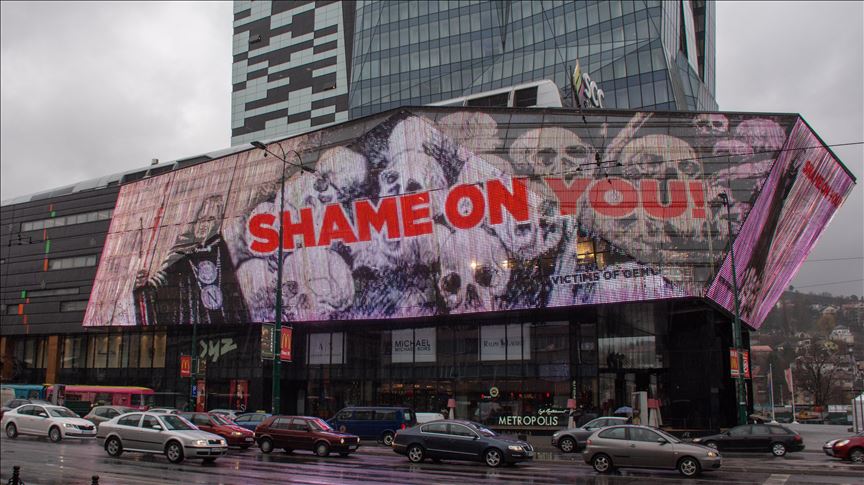Protests grow as Srebrenica genocide denier awarded Nobel medal
World slams Swedish Academy's pick for Nobel Price in literature who denies UN court ruled Srebrenica genocide

BELGRADE, Serbia
Swedish Academy on Tuesday picked a 77-year-old Austrian author Peter Handke for Nobel Prize in literature this year, despite his denial of 1995 Srebrenica genocide where over 8,300 Muslims were killed by Serbian forces.
The academy’s pick has received a pouring backlash worldwide over the winner’s denial of the 1995 genocide.
Austrian author Peter Handke won the prize despite his denial of the Bosnian genocide claiming the Muslim Bosniaks in Sarajevo had killed themselves.
He also openly supported Serbian leader Slobodan Milosevic, who died in 2006 at the international tribunal in The Hague on trial for war crimes and genocide.
Earlier, several countries, including Turkey, boycotted the award ceremony on Tuesday.
Turkish, Albanian, Kosovar and Croatian envoys to Sweden did not attend the ceremony.
After the ceremony, Bosnian Croat President Zeljko Komsic said Srebrenica genocide was awarded on the occasion.
Serbian President Aleksandar Vucic congratulated Handke.
Vucic also invited Handke to visit Serbia.
"Serbia regards you as a true friend and I will avail myself to the opportunity to say that we perceive your Nobel Prize as having been won by one of us. Now, along with Ivo Andric, we are celebrating yet another of our Nobel Prize winners," said Vucic.
Meanwhile, Turkey’s president condemned the awarding of Handke, as the writer is a denier of the 1992-1995 Bosnian genocide.
"Awarding a racist individual Nobel Prize in literature will not mean anything other than awarding human rights violations," Recep Tayyip Erdogan said in a message marking the Human Rights Day.
Moreover, an outpour of criticism was witnessed in local media of Bosnia and Herzegovina and Croatia over the controversial Nobel Prize.
Swedish physician Dr. Christina Doctare -- part of the UN peacekeeping team during the Bosnian war -- returned her 1988 Nobel Peace Prize to the Royal Swedish Academy to protest Handke getting the award.
Srebrenica was besieged by Serb forces who were trying to wrest territory from Bosnian Muslims and Croats to form their own state.
More than 8,300 Bosnian Muslim men and boys were killed after Bosnian Serb forces attacked the UN "safe area" of Srebrenica in July 1995, despite the presence of Dutch troops tasked with acting as international peacekeepers.
The UN Security Council had declared Srebrenica a "safe area" in the spring of 1993. But Serb troops led by Gen. Ratko Mladic -- later found guilty of war crimes, crimes against humanity, and genocide -- overran the UN zone.
The Dutch troops failed to act as Serb forces occupied the area, killing about 2,000 men and boys on July 11 alone. Some 15,000 Srebrenica people fled into the surrounding mountains, but Serb troops hunted down and killed 6,000 of them in the forests.
Every year on July 11, newly identified victims of the genocide are laid to rest in a memorial cemetery in Potocari, eastern Bosnia. Thousands of visitors from various countries attend the service.
The memorial center is the focal point of remembrance for friends and relatives of the victims, mostly men and boys, murdered by Bosnian Serb militias.
With this year’s service, the number of burials in the cemetery rose to 6,643.
At the service, relatives of the victims bid emotional final farewells to their loved ones.
Many Serbs in the region effectively deny the genocide in Srebrenica, attempting to minimize it as a crime committed by a group of Serbs.

Also at the historic bridge in Mostar -- an iconic multi-faith city -- people gather to throw white lilies into the Neretva River, symbolizing the innocence of the genocide’s victims.
Elsewhere, hundreds of motorcyclists from across Europe hold a procession from the country's capital Sarajevo to Srebrenica to commemorate the victims.
More than 300 bicyclists from across the country also gather in the northern city of Bihac to honor the victims.
Thousands of people from all over the world set off on a three-day commemorative peace march in the town of Nezuk near the Bosnian city of Tuzla.
More than 6,000 participants traveled about 35 kilometers (22 miles) each day to reach Potocari, spending the nights in designated wooded areas.
During the long walk, they heard details of the genocide and memories of survivors who took the so-called "Death Road" in their attempt to flee Bosnian Serb forces during the war.
Anadolu Agency website contains only a portion of the news stories offered to subscribers in the AA News Broadcasting System (HAS), and in summarized form. Please contact us for subscription options.




